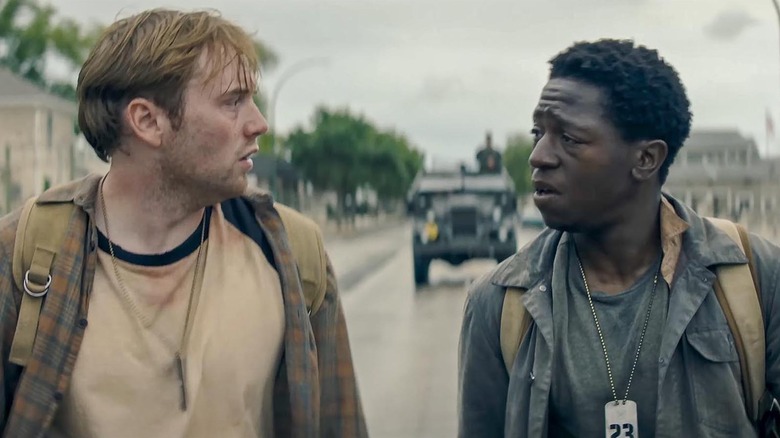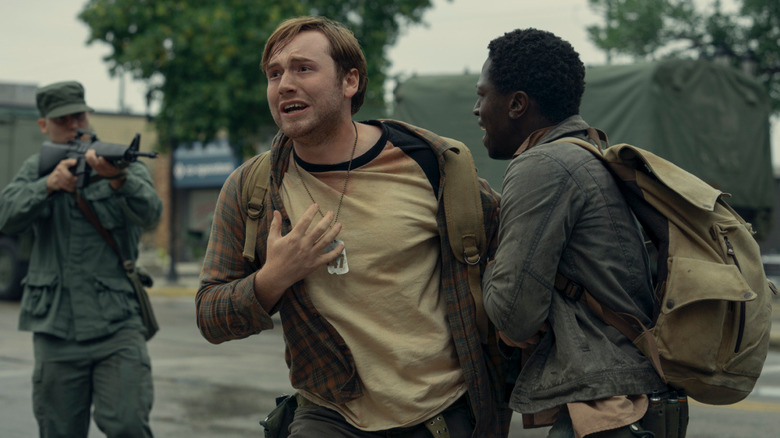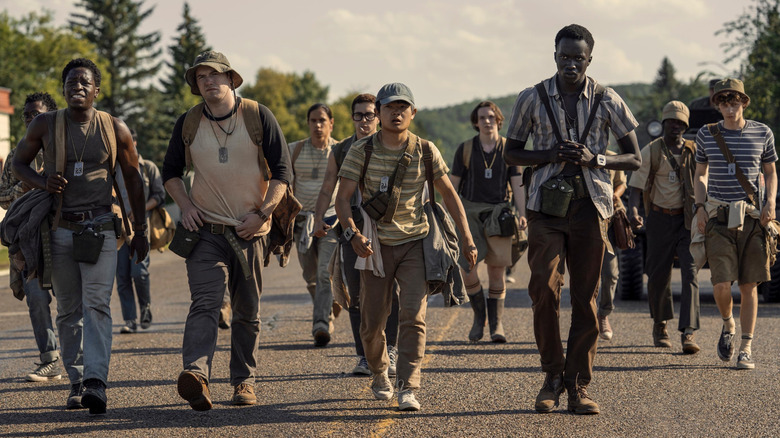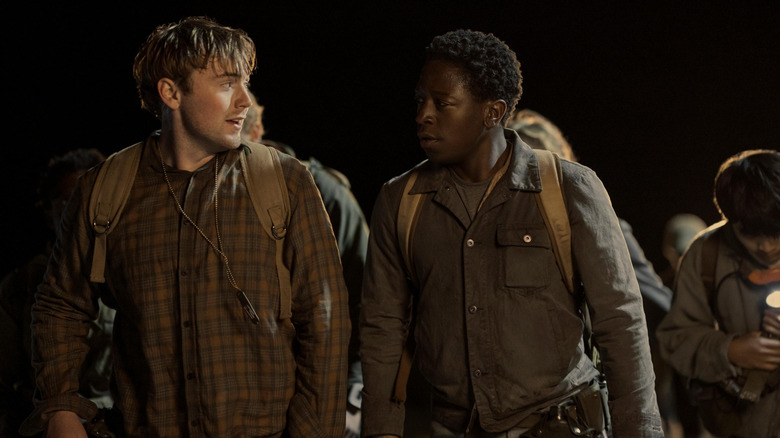The Long Walk Review: An Emotionally Obliterating All-Time Great Stephen King Adaptation
When Stephen King was 19 years old, the Vietnam War draft lottery had forced thousands of teenage boys from across the country into the line of fire. It wasn't a matter of "if" you were called to war, but "when." It was then that King began writing "The Long Walk," a story about a group of boys — also chosen by lottery — who participate in an annual competition to out-walk each other to the death, where there is one winner and no finish line. He eventually published it under his Richard Bachman pseudonym. King didn't set out to write a political thriller, but after absorbing the constant barrage of news of bloodshed surrounding the lives of American teenagers, the themes manifested anyway. It was impossible for them not to.
Horror legend George A. Romero, Frequent King-adaptor Frank Darabont, and Norwegian horror maestro André Øvredal have all at points been attached to bring King's most merciless story to the big screen, but we should be eternally grateful that none of these films came to fruition, as the new release from Lionsgate is a heartbreaking triumph. With a script from "Strange Darling" writer/director JT Mollner and directed by "The Hunger Games" franchise helmer Francis Lawrence, "The Long Walk" is an emotionally obliterating all-time great Stephen King adaptation, and undoubtedly one of the best films of 2025.
I've read "The Long Walk" at least a half dozen times, with every gut-wrenching beat and awful revelation etched into my psyche. You'd think that familiarity would forge some kind of emotional armor, but no amount of intimacy with the source material can brace you for the inevitable devastation on screen. I left the theater exhausted and hollowed out with eyes sore from wiping tears, carrying the weight of what I had just witnessed in the pit of my knotted stomach. Because just like the walking competition itself, knowing how it ends doesn't make it hurt any less.
The Long Walk earns every bit of audience devastation
While the titular walk is broadcast to millions across the country and King's novel often lingers on those spectating, the film wisely stays on the road, embedded with the boys. There's no visual hint of a better life ahead, only the chilling promise from The Major (Mark Hamill), flanked by silent, armed guards: untold riches and a wish without limits await the last one standing. These assurances are what the boys are all working toward — three miles per hour until they're the last ones standing.
In totalitarian, fascist, and even everyday capitalist systems, wealth is gated by birthright, assimilation, or the cold willingness to climb over others. "The Long Walk" makes metaphor literal; the lie of "anyone can make it if they try" coexists with the brutal truth that most won't. These boys come from farm towns and big cities; some are athletic, while others artistic. The sacred and secular walk in step, their faces reflecting the vast patchwork of America. Whoever they were before the first step doesn't matter anymore. The looming certainty of death is the great equalizer.
There's no flinching or softening of the brutality, and no matter how many boys meet their demise, watching them die never gets easier. Locals gape, almost frozen in time, as the parade of death trudges past. The visual of abandoned stretches of rural greenery twists from postcard-ready landscape beauty into a bleak, sun-soaked purgatory. There is no tranquility in the wind dancing through overgrown grass as it's interrupted by gunshots, and the shadows cast onto the ground are soured by the dripping sweat you can practically taste from your seat.
Police officers and war veterans stand at attention on the sidelines, saluting a horde on call for extinction as they are led to the slaughter instead of questioning why it's happening in the first place. A quiet despair simmers beneath the boys' scuffed soles, but hope, defiance, and the reckless tenacity of youth keep pushing them forward like flowers breaking through concrete — the visual manifestation of "thoughts and prayers" from disconnected elders met with a righteous middle finger delivered by the young.
The Long Walk for the inaugural Achievement in Casting Oscar
There are far fewer spectators in the film than in King's book; a welcome shift, especially for a modern audience attuned to the pressures of constant surveillance. Instead, the focus turns inward, toward what truly matters: the relationships forged between these boys. Cooper Hoffman and David Jonsson are the emotional center as Raymond Garraty and Peter McVries, but every character — no matter how briefly seen on the road — makes their presence felt. Cherubic-faced Roman Griffin Davis stuns as the underage Thomas Curley, signaling that the little boy we loved in "Jojo Rabbit" has left childhood behind. Seeing Jordan Gonzalez ("Pretty Little Liars: Original Sin"), one of our most promising transgender actors, unquestionably welcomed into the group without an asterisk, makes the outcome of his Richard Harkness layered in its heartbreak.
Joshua Odjick as Collie Parker, Garrett Wareing as Stebbins, and Charlie Plummer as Gary Barkovitch arguably have the most difficult task: finding the heart and humanity of the three most disliked and antagonistic characters in the group without ever portraying them as villains. As the walk strips away their defenses and crumbles their macho façades, we're left with raw vulnerability. Even if their attitudes frustrate us, there's no satisfaction when they receive their ticket, only grief, thanks to performances that refuse to offer us the relief of hating them.
"The Eight Musketeers" from the book are condensed down to four, with Tut Nyuot as Arthur Baker and Ben Wang as Hank Olson joining Garraty/McVries, and Olson adding one of the major traits of Scramm (omitted from the film) to his cocky, motor-mouthed character. The camaraderie shown by the group is not unlike the foxhole friendships developed between soldiers during wartime, but given the hopelessness of their situation, it starts to feel like we're watching the American version of "All Quiet on the Western Front." Wang provides a majority of the much-needed levity with his sharp tongue and fearless delivery, while Baker's warm, gentle optimism represents the best of humanity.
We fall in love with these characters because we feel like we know them, making it even more jarring when these personalities gradually distort them into something unrecognizable.
Cooper Hoffman and David Jonsson are a marvel
Stephen King is rightfully celebrated for his mastery of horror, but far less often is he praised for his piercing, often uncomfortable insight into the emotional interior lives of young men. Beneath the supernatural dread of The Losers Club in "It" and the nostalgic ache of revisiting yesteryear in "The Body" (which became the gold standard of coming-of-age stories about white boyhood in "Stand By Me") lies a profound exploration of the fragile, formative bonds between boys; their fears, their loyalties, and their longing for connection in a world that often denies them emotional vocabulary or permission of expression. But "The Long Walk" has always been my favorite example of valorizing the friendships nurtured between and by boys, allowing them to carry the same weight as any romantic love story. It argues, with aching clarity, that these connections can shape a person for the rest of their life.
Garraty and McVries, as personified by Hoffman and Jonsson, produce an eternal chemistry that sets the new bar for King protagonists. From the moment they introduce themselves to one another, it's like there's a gravitational pull between them that feels as guileless and inescapable as the walk itself. Mollner's script takes a page out of Frank Darabont's guidebook when adapting "The Mist," improving upon King's fantastic source material, reshaping and redistributing character traits between the duo in ways that feel equal parts respectful and revelatory. Nothing feels lost by condensing the nearly 400-page book into under two hours, and prioritizing their relationship gives the film an urgency as high-stakes as the walk itself.
Their love, whether it canonically be platonic, romantic, or something impossible to understand unless under the circumstances of The Walk, is the lifeblood of the entire film, even as the body count rises around them. Just as it can only be Garraty and McVries, this film can only be led by Hoffman and Jonsson. Each conversation between the pair is transfixing, with a quiet desperation in every glance, every step in tandem, and every line delivered with the subtle quake of boys who know they're on borrowed time.
No matter how exhausted, desperate, or in agony they appear, you can't help but hope they keep walking. Not just to survive, but so we, the audience, don't have to say goodbye to them either.
/Film Rating: 9 out of 10
"The Long Walk" steps into theaters on September 12, 2025.



